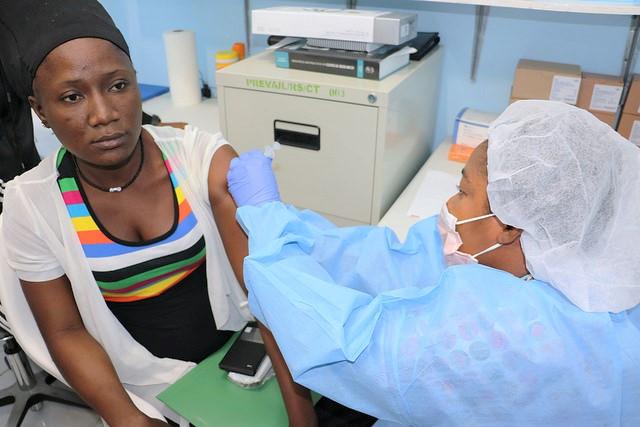A trial at the end of Liberia's Ebola outbreak of two candidate vaccines that were furthest along in development at the time showed both posed no major safety concerns and triggered immune responses that lasted at least a year, researchers from a US-Liberian clinical research partnership reported today.
Liberia was the first of the three hard-hit countries to become free of the disease. But in October 2014, the country's health ministry had asked US health officials for investigational tools to help curb the outbreak, which led to the formation of Partnership for Research on Ebola Virus in Liberia (PREVAIL).
Scientists launched the trial in February 2015 hoping to do a phase 3 study, but they had to scale back to a phase 2 trial because of a steep fall in disease activity that made it impossible to gauge the effectiveness of the vaccines with a phase 3 trial.
The team—reporting its findings in the New England Journal of Medicine—compared an adenovirus-based vaccine (ChAd3) developed by the National Institute of Allergy and Infectious Diseases (NIAID) and GlaxoSmithKline and a recombinant vesicular stomatitis virus-based vaccine (VSV-EBOV) developed by researchers in Canada and now licensed by Merck with a placebo saline injection.
A ring vaccination trial of VSV-EBOV conducted in Guinea in the spring and summer of 2015 had already shown that VSV-EBOV was highly effective in people who received it soon after exposure. And, when used as part of the same strategy, the vaccine has been shown to tamp down small Ebola flare-ups that occurred at the tail end of West Africa's Ebola outbreak.
Good antibody response at 1-year mark
The trial, which was sponsored by NIAID, part of the National Institutes of Health (NIH), involved 1,500 adults who had no history of Ebola and received one of the vaccines or placebo. Researchers examined participants' blood samples before vaccination and at four intervals afterward: 1 week, 1 month, 6 months, and 1 year.
At the 1-week mark, antibody responses were modest for both vaccines. But by 1 month 71% of those who received ChAd3 and 84% of those who got VSV-EBOV developed antibody titers that were four times higher than baseline levels or higher. For comparison, only 3% of the placebo group showed such an antibody response.
By 1 year, both vaccine groups maintained most of their antibody responses—64% of the ChAd3 group and 80% of VSV-EBOV recipients. Of the placebo group, 7% still had an antibody response at 1 year.
Some of the participants who received one of the two candidate vaccines had mild to moderate side effects that resolved, including headache, muscle pain, feverishness, and fatigue. The patterns were similar to what research teams had seen in earlier phase 1 studies for both vaccines.
The researchers didn't identify any major safety concerns. Most of the serious medical events that surfaced in the trial were due to malaria. Joint pain incidence didn't vary among the three Liberian groups, and the team found none of the arthritis that had been reported in some recipients of VSV-EBOV in an earlier trial in Geneva.
Unexpected findings, study limitations
The investigators also found some surprises during the study. In baseline blood tests, they found that 4% already had some Ebola antibodies, hinting at past Ebola infection, but with no known clinical illness.
Also, they found that, 1 year after vaccination, malaria levels were lower in people who had received one of the two candidate vaccines, especially those who got VSV-EBOV. The researchers wrote that more studies are needed to see if the finding is due to chance or if the vaccine might offer cross-reactive immunity.
The team highlighted some limitations of the study, including that the trial did not include children. "The demonstration of safety and efficacy of these vaccines in children is a priority, since 16% of the persons with EVD [Ebola virus disease] in the current epidemic were children."
The investigators also noted the lack of lab correlates of protection, which they said makes it hard to assess the clinical significance of any long-term antibody changes. They also noted that they couldn't test vaccine efficacy, given that the number of new Ebola cases in Liberia dropped so quickly as public health interventions gained traction.
"This situation emphasized the importance of completing phase 1 studies before outbreaks occur and of being prepared to initiate phase 2 and phase 3 trials as soon as such outbreaks occur," they wrote.
Promise for research in outbreak settings
On the other hand, strengths of the study included inclusion of a placebo control group and involvement of two vaccines that had advanced through phase 1 trials.
Anthony Fauci, MD, NIAID's director, said in an NIH news release today that the trial yielded valuable information essential for continued development of both vaccines and shows that well-designed ethically sound clinical research can be conducted during an epidemic.
"A safe and effective vaccine would be a critically important addition to classical public health measures in controlling inevitable future Ebola outbreaks," he said.
Bernice Dahn, MD, MPH, Liberia's health minister, said in the release that the country has shown the global community that rigorous scientific research can be conducted in a developing sub-Saharan African country when mutually beneficial partnerships are in place. "The work of PREVAIL, ranging from the Ebola vaccine to the Ebola survivor studies, clearly manifest[s] the prospects of such a sustainable partnership and clinical research platform," she added.
See also:
Oct 11 N Engl J Med abstract
Oct 11 NIH press release


















